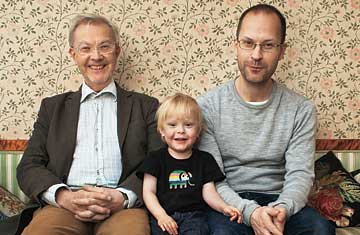
Three generations: Dr. Lars Olov Bygren, with son Magnus and grandson Ludvig in Stockholm
(6 of 8)
Pembrey and Bygren knew they needed to replicate the Overkalix findings, but of course you can't conduct an experiment in which some kids starve and others overeat. (You also wouldn't want to wait 60 years for the results.) By coincidence, Pembrey had access to another incredible trove of genetic information. He had long been on the board of the Avon Longitudinal Study of Parents and Children (ALSPAC), a unique research project based at the University of Bristol, in England. Founded by Pembrey's friend Jean Golding, an epidemiologist at the university, ALSPAC has followed thousands of young people and their parents since before the kids were born, in 1991 and 1992. For the study, Golding and her staff recruited 14,024 pregnant mothers--70% of all the women in the Bristol area who were pregnant during the 20-month recruitment period.
The ALSPAC parents and kids have undergone extensive medical and psychological testing every year since. Recently, I met an ALSPAC baby, Tom Gibbs, who is now a sturdy 17-year-old. I accompanied him as clinicians measured his height (178 cm, or 5 ft. 8 in., not including spiked blond hair), the bone density of his left femur (1.3 g/sq cm, which is above average) and a host of other physical traits.
All this data collection was designed from the outset to show how the individual's genotype combines with environmental pressures to influence health and development. ALSPAC data have offered several important insights: baby lotions containing peanut oil may be partly responsible for the rise in peanut allergies; high maternal anxiety during pregnancy is associated with the child's later development of asthma; little kids who are kept too clean are at higher risk for eczema.
But Pembrey, Bygren and Golding--now all working together--used the data to produce a more groundbreaking paper, the most compelling epigenetic study yet written. Published in 2006 in the European Journal of Human Genetics, it noted that of the 14,024 fathers in the study, 166 said they had started smoking before age 11--just as their bodies were preparing to enter puberty. Boys are genetically isolated before puberty because they cannot form sperm. (Girls, by contrast, have their eggs from birth.) That makes the period around puberty fertile ground for epigenetic changes: If the environment is going to imprint epigenetic marks on genes in the Y chromosome, what better time to do it than when sperm is first starting to form?
